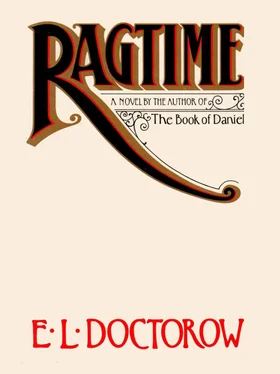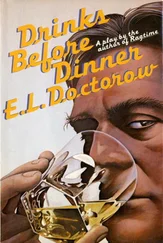Edgar Doctorow - Ragtime
Здесь есть возможность читать онлайн «Edgar Doctorow - Ragtime» весь текст электронной книги совершенно бесплатно (целиком полную версию без сокращений). В некоторых случаях можно слушать аудио, скачать через торрент в формате fb2 и присутствует краткое содержание. Жанр: Современная проза, на английском языке. Описание произведения, (предисловие) а так же отзывы посетителей доступны на портале библиотеки ЛибКат.
- Название:Ragtime
- Автор:
- Жанр:
- Год:неизвестен
- ISBN:нет данных
- Рейтинг книги:4 / 5. Голосов: 1
-
Избранное:Добавить в избранное
- Отзывы:
-
Ваша оценка:
- 80
- 1
- 2
- 3
- 4
- 5
Ragtime: краткое содержание, описание и аннотация
Предлагаем к чтению аннотацию, описание, краткое содержание или предисловие (зависит от того, что написал сам автор книги «Ragtime»). Если вы не нашли необходимую информацию о книге — напишите в комментариях, мы постараемся отыскать её.
Ragtime — читать онлайн бесплатно полную книгу (весь текст) целиком
Ниже представлен текст книги, разбитый по страницам. Система сохранения места последней прочитанной страницы, позволяет с удобством читать онлайн бесплатно книгу «Ragtime», без необходимости каждый раз заново искать на чём Вы остановились. Поставьте закладку, и сможете в любой момент перейти на страницу, на которой закончили чтение.
Интервал:
Закладка:
Unknown to Houdini, Mrs. Stuyvesant Fish has also engaged for the evening the entire sideshow of the Barnum and Bailey circus. She liked to shock fuddy-duddies. Houdini was led into some sort of waiting room where he found himself encircled by a mob of freaks all of whom had heard of him and wanted to touch him. Creatures with scaled iridescent skins and hands attached to their shoulders, midgets with the voices of telephones, Siamese twin sisters who leaned in opposite directions, a man who lifted weights from iron rings permanently attached to his breasts. Houdini removed his cape and his top hat and his white gloves and handed them to the assistant. He slumped in a chair. His grips were waiting for instructions. The freaks yattered at him.
But the room itself was very beautiful, with carved wood ceilings and Flemish tapestries of Actaeon being torn apart by dogs.
Early in his career Houdini had worked in a small circus in western Pennsylvania. He recalled his loyalties now in order to regain his composure. One of the midgets, a woman, separated herself from the rest and got everyone to step back a few paces. She turned out to be the eminent Lavinia Warren, the widow of General Tom Thumb, the most famous midget of all. Lavinia Warren Thumb was dressed in a magnificent gown supplied by Mrs. Fish: it was supposed to be a joke on Mrs. Fish’s nemesis, Mrs. William Astor, who had worn the identical design the previous spring. Lavinia Thumb was coifed in the Astor manner and wore glittering copies of the Astor jewels. She was nearly y years old and carried herself with dignity. Upon her wedding fifty years ago before she and Colonel Thumb had been received in the White House by the Lincolns. Houdini wanted to cry. Lavinia was no longer working in the circus but she had come down to New York from her home in Bridgeport, a clapboard house with escalloped bargeboards and a window’s walk, which cost something to maintain. That was why she had taken this evening’s job. She lived in Bridgeport to be near the grave of her husband, who had died many years before and was commemorated in stone atop a monumental columns in Mountain Grove Cemetery. Lavinia was two feet tall. She came to Houdini’s knees. Her voice had deepened with age and she now spoke in the tones of a normal twenty-year-old girl. She had sparkling blue eyes, silver-white hair and the finest of wrinkles on her clear white skin. Houdini was reminded of his mother. Come on, kid, do a coupla numbers for us, Lavinia said.
Houdini entertained the circus folks with sleight of hand and some simple tricks. He put a billiard ball in his mouth, closed his mouth, opened it, and the billiard ball was gone. He closed his mouth and opened it again and removed the billiard ball. He stuck an ordinary sewing needle into his cheek and pulled it through the inner side. He opened his hand and produced a live chick. He withdrew from his ear a stream of colored silk. The freaks were delighted. They applauded and laughed. When he felt he had discharged his responsibilities, Houdini rose and told his manager he would not perform for Mrs. Stuyvesant Fish. There were remonstrations. Houdini stormed out of the door. Crystal light dazzled his eyes. He was in the grand ballroom of the doge palace. A string orchestra played from a balcony. Great pale red drapes framed the clerestory windows and four hundred people were waltzing on a marble floor. Shading his eyes he saw bearing down on him Mrs. Fish herself, a clutch of jeweled feathers rising from her piled hair, roped of pearls swinging pendulously from her neck, a witticism forming on her lip like the bubbles of an epileptic.
Despite such experiences Houdini never developed what we think of as political consciousness. He could not reason from his own hurt feelings. To the end he would be almost totally unaware of the design of his career, the great map of revolution laid out by his life. He was a Jew. His real name was Erich Weiss. He was passionately in love with ancient mother whom he had installed in his brownstone home on West 113th Street. In fact Sigmund Freud had just arrived in America to give a series of lectures at Clark University in Worcester, Massachusetts, and so Houdini was destined to be, with Al Jolson, the last of the great shameless mother lovers, a nineteenth-century movement that included such men as Poe, John Brown, Lincoln and James McNeill Whistler. Of course Freud’s immediate reception in America was not auspicious. A few professional alienists understood his importance, but to most of the public he appeared as some kind of German sexologist, an exponent of free love who used big words to talk about dirty things. At least a decade would have to pass before Freud would have his revenge and see his ideas begin to destroy sex in America forever.
6
Freud arrived in New York on the Lloyd liner George Washington . He was accompanied by his disciples Jung and Ferenczi, both some years his junior. They were met at the dock by two more younger Freudians, Drs. Ernest Jones and A. A. Brill. The entire party dined at Hammerstein’s Roof Garden. There were potted palms. A piano violin duo played Liszt’s Hungarian Rhapsody . Everyone talked around Freud, glancing at him continuously to gauge his mood. He ate cup custard. Brill and Jones undertook to play host for the visit. In the days following they showed Freud Central Park, the Metropolitan Museum and Chinatown. Catlike Chinamen gazed at them out of dark shops. There were glass cabinets filled with litchi nuts. The party went to one of the silent films so popular in stores and nickelodeons around the city. White smoke rose from the barrels of rifles and men wearing lipstick and rouge fell backwards clutching their chests. At least, Freud thought, it is silent. What oppressed him about the New World was its noise. The terrible clatter of horses and wagons, the clanking and screeching of streetcars, the horns of automobiles. At the wheel of an open Marmon, Brill drove the Freudians around Manhattan. At one point, on Fifth Avenue, Freud felt as if he was being observed; raising his eyes he found some children staring down at him from the top of a double-decker bus.
Brill drove the party down to the Lower East Side with its Yiddish theatres and pushcarts and elevated trains. The fearsome elevated rumbled past the windows of tenements in which people were expected to live. The windows shook, the very buildings shook. Freud had to relieve himself and nobody seemed to be able to tell him where a public facility could be found. They all had to enter a dairy restaurant and order sour cream with vegetables so that Freud could go to the bathroom. Later, back in the car, they pulled up to a corner to watch a street artist at work, an old man who with nothing but a scissors and paper made miniature silhouette portraits for a few cents. Standing for her portrait was a beautiful well-dressed woman. The excitable Ferenczi, masking his admiration for the woman’s good looks, declared to his colleagues in the car his happiness at finding the ancient art of silhouette flourishing on the streets of New York. Freud, clamping his teeth on his cigar, said nothing. The motor idled. Only Jung noticed the little girl in the pinafore standing slightly behind the young woman and holding her hand. The little girl peeked at Jung and the shaven-headed Jung, who was already disagreeing on certain crucial matters with his beloved mentor, looked through hid thick steel-rimmed spectacles at the lovely child and experienced what he realized was a shock of recognition, although at the moment he could not have explained why. Brill pressed the gear pedal and the party continued on its tour. Their ultimate destination was Coney Island, a long way out of the city. They arrived in the late afternoon and immediately embarked on a tour of the three great amusement parks, beginning with Steeplechase and going on to Dreamland and finally late at night to the towers and domes, outlined in electric bulbs, of Luna Park. The dignified visitors rode the shoot-the-chutes and Freud and Jung took a boat together through the tunnel of Love. The day came to a close only when Freud tired and had one of the fainting fits that had lately plagued him when in Jung’s presence. A few days later the party journeyed to Worcester for Freud’s lectures. When the lectures were completed Freud was persuaded to make an expedition to the great natural wonder of Niagara Falls. They arrived at the falls on an overcast day. Thousands of newly married couples stood, in pairs, watching the great cascades. Mist like an inverted rain rose from the falls. There was a high wire strung from one shore to the other and some manic in ballet slippers and tights was walking the wire, keeping his balance with a parasol. Freud shook his head. Later the party went to the Cave of Winds. There, at an underground footbridge, a guide motioned the others back and took Freud’s elbow. Let the old fellow go first, the guide said. The great doctor, age fifty-three, decided at this moment that he had enough of America. With his disciples he sailed back to Germany on the Kaiser Wilhelm der Grosse . He had really gotten used to the food or the scarcity of American public facilities. He believed the trip had ruined both his stomach and his bladder. The entire population seemed to him over-powered, brash and rude. The vulgar wholesale appropriation of European art and architecture regardless of period or country he found appalling. He had seen in our careless commingling of great wealth and great poverty the chaos of an entropic European civilization. He sat in his quiet cozy study in Vienna, glad to be back. He said to Ernest Jones, America is a mistake, a gigantic mistake.
Читать дальшеИнтервал:
Закладка:
Похожие книги на «Ragtime»
Представляем Вашему вниманию похожие книги на «Ragtime» списком для выбора. Мы отобрали схожую по названию и смыслу литературу в надежде предоставить читателям больше вариантов отыскать новые, интересные, ещё непрочитанные произведения.
Обсуждение, отзывы о книге «Ragtime» и просто собственные мнения читателей. Оставьте ваши комментарии, напишите, что Вы думаете о произведении, его смысле или главных героях. Укажите что конкретно понравилось, а что нет, и почему Вы так считаете.












